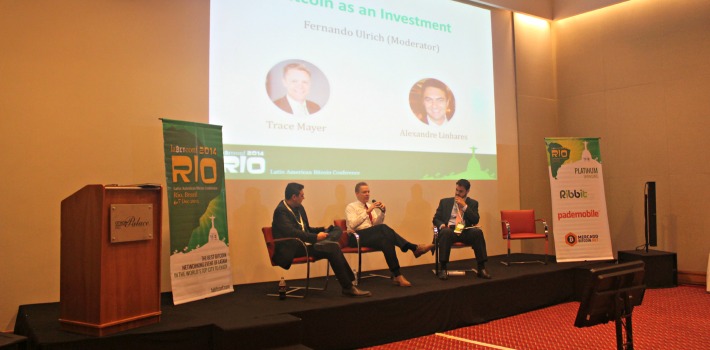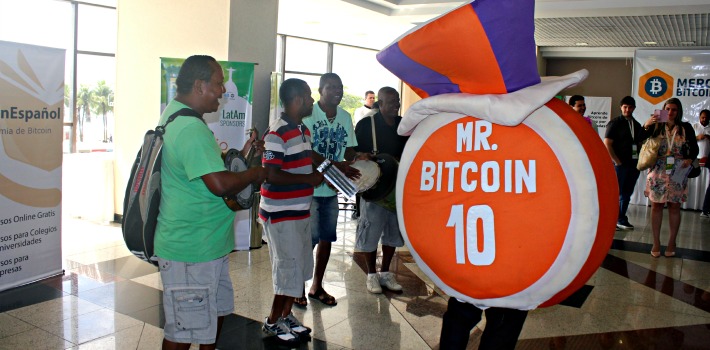A Coming-of-Age Story at Rio de Janeiro Conference

The
event held in the Rio Othon Hotel Palace highlighted bitcoin’s
potential in Latin America, in the face of “financial oppression”
experienced in many countries in the region. (PanAm Post)
Now no-one can stop the increasingly rapid adoption of bitcoin around the world. That, at least, was the message of the organizers at the second annual Latin American Bitcoin Conference that took place last weekend in Río de Janeiro, Brazil.
Much discussion centered on the virtual currency as the money of the future, with several commentators suggesting that its use by individuals and corporations will soon be inevitable.
Although there’s no precise way to estimate the level of bitcoin’s penetration in Latin America, Franco Amati, one of the event’s organizers, explained that Argentina and Mexico currently lead the field, with the greatest number of enterprises using the online currency.
The conference’s hosts sought to strengthen the continental reach of the currency by fostering relationships between entrepreneurs, and share experiences of success and failure with regard to licensing, the benefits of open-source software, and marketing strategies.
“We’re making history here,” said Diego Gutiérrez, one of the organizers, about the changes that bitcoin could bring to the international financial system.
In particular, bitcoin could help Latin Americans overcome the “financial oppression” that they have historically faced, said the founder and co-organizer of the Brazil Bitcoin Foundation, Fernando Ulrich.
Ulrich explained that the idea of hosting the conference in Brazil followed on from the success of the first conference, held in December 2013 in Buenos Aires, Argentina: “This year we wanted to deal with the different sides of bitcoin: marketing, technology, and business development.”
Compared with the 300 attendees at the 2013 conference, some 180 people took part this year. Many might have been turned off by the fact that the current price of Bitcoin has fallen to around US$370, compared to a value of some $1,000 this time last year.
Ariel Aguilar, a young Argentinean better known as “the Bitcoin Evangelist,” told the PanAm Post that the digital currency is entering a period where it needs greater publicity: “I wanted to come here to build new friendships among bitcoin users and developers. It was a huge event, with loads of energy.”
For Mexican Lucía Cangas, a member of Pademobil, an online payment platform that acts as a virtual wallet for bitcoin, “came to network, and get involved in the latest thing that’s happening in Latin America.”
Also among the attendees were Tony Gallipi, CEO of Bitpay, his sister Connie Gallipi, founder of the NGO BitGive, and Sergio Lerner, recently named a full-time developer by the United States Bitcoin Foundation, working on security issues involving the online currency.
Also represented were members of Xapo, Coinbase, Bitpagos, Coinapult, 37 Coins, Mercado Bitcoin, Monetas, Ethereum, StorJ, BTCJam, among others, illustrating the diversity of bitcoin business models that currently exist.
Bitcoin Difficulty Level: Advanced
It definitely wasn’t a conference for bitcoin beginners. A single introductory video at the start of the event gave way to discussion panels taking on themes of business development, regulatory difficulties, and new technological platforms.Several panels presented the development of digital wallets and services that allow users to store money online and to review bitcoin data through the Blockchain, “a public ledger of all transactions in the bitcoin network.”
Bitcoin, many speakers at the event underlined, is not only a currency but a technology. During the first day of the conference, delegates emphasized the need for entrepreneurs and other creative minds to continue to boost innovation.
Tony Gallipi mentioned that BitPay is looking to expand to Latin America, most likely beginning in Brazil. He admitted that the acquisition of bitcoins would have to be made easier for their use to become more popular. In this line, he presented Getbits, an online platform that allows Facebook users to see which of their friends know about and use bitcoin.
Huego Cuevas further advised that entrepreneurs should seek to associate with those companies that already have a license and choose a geographical “corridor” to operate in — for example, between two countries. He also suggested that bitcoin startups should limit themselves to one side of the transaction, either sending or receiving money.
During Sunday afternoon’s panel on new businesses in Latin America, the experts highlighted the difficulty of finding patrons and investors in places like Argentina. “There, they think that [a bitcoin intermediary is] simply a bank; they’re not interested in the product,” said Gustavo Guida of BTCJam.
“On the contrary, in the United States, they’re interested, they get involved, and they can even help you by sharing their contacts,” Guida added.
Juan Llanos was tasked with speaking on one of the more controversial themes of the event: regulation. According to the US-based Argentinean, bitcoin companies should avoid attacking governments or banks.
“It’s a war that can’t be won, and making such powerful enemies won’t benefit bitcoin in any way,” Llanos warned.
The event ended with a call to action for all the Latin-American bitcoin community to support the Argentinean Bitcoin Foundation and Bitcoin Brazil by spreading the word about the new currency and technology.
Rodolfo Andragnes of Bitcoin Argentina had the last word: “See you at Mexico 2015!”



No comments:
Post a Comment